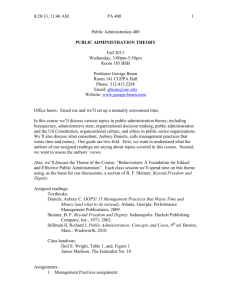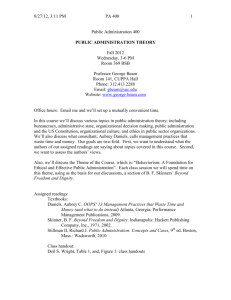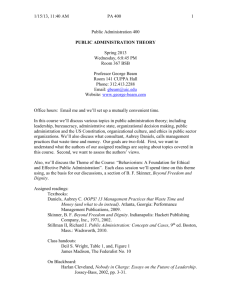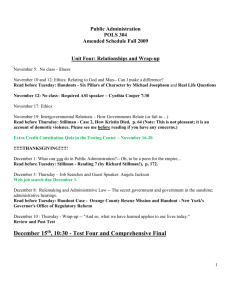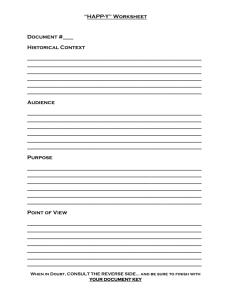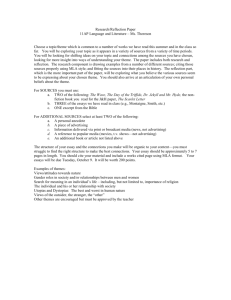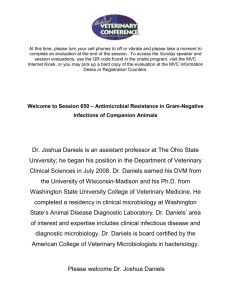Public Administration Theory
advertisement
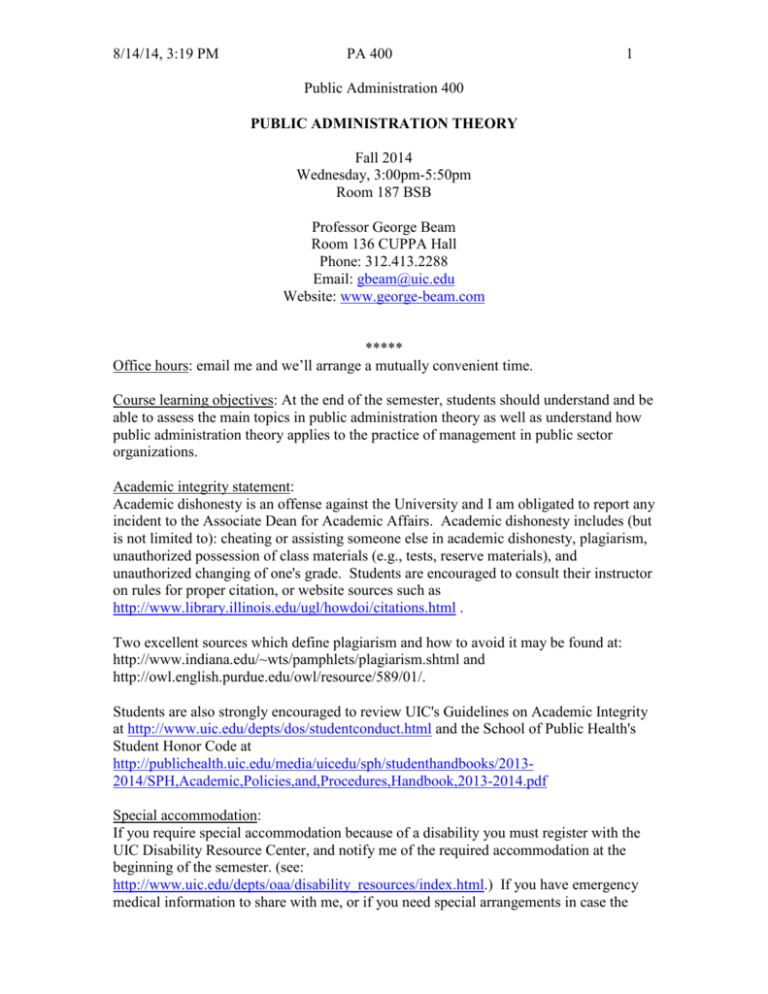
8/14/14, 3:19 PM PA 400 1 Public Administration 400 PUBLIC ADMINISTRATION THEORY Fall 2014 Wednesday, 3:00pm-5:50pm Room 187 BSB Professor George Beam Room 136 CUPPA Hall Phone: 312.413.2288 Email: gbeam@uic.edu Website: www.george-beam.com ***** Office hours: email me and we’ll arrange a mutually convenient time. Course learning objectives: At the end of the semester, students should understand and be able to assess the main topics in public administration theory as well as understand how public administration theory applies to the practice of management in public sector organizations. Academic integrity statement: Academic dishonesty is an offense against the University and I am obligated to report any incident to the Associate Dean for Academic Affairs. Academic dishonesty includes (but is not limited to): cheating or assisting someone else in academic dishonesty, plagiarism, unauthorized possession of class materials (e.g., tests, reserve materials), and unauthorized changing of one's grade. Students are encouraged to consult their instructor on rules for proper citation, or website sources such as http://www.library.illinois.edu/ugl/howdoi/citations.html . Two excellent sources which define plagiarism and how to avoid it may be found at: http://www.indiana.edu/~wts/pamphlets/plagiarism.shtml and http://owl.english.purdue.edu/owl/resource/589/01/. Students are also strongly encouraged to review UIC's Guidelines on Academic Integrity at http://www.uic.edu/depts/dos/studentconduct.html and the School of Public Health's Student Honor Code at http://publichealth.uic.edu/media/uicedu/sph/studenthandbooks/20132014/SPH,Academic,Policies,and,Procedures,Handbook,2013-2014.pdf Special accommodation: If you require special accommodation because of a disability you must register with the UIC Disability Resource Center, and notify me of the required accommodation at the beginning of the semester. (see: http://www.uic.edu/depts/oaa/disability_resources/index.html.) If you have emergency medical information to share with me, or if you need special arrangements in case the 8/14/14, 3:19 PM PA 400 2 building must be evacuated, please inform me immediately. Please see me privately after class, at my office, or email me. ***** In this course we’ll discuss various topics in public administration theory; including bureaucracy, administrative state, organizational decision making, public administration and the US Constitution, organizational culture, ethics in public sector organizations, and behaviorism as a foundation for ethical and effective public administration. We’ll also discuss what consultant, Aubrey Daniels, calls “management practices that waste time and money”. Our goals are two-fold. First, we want to understand what the authors of our assigned readings are saying about topics covered in this course. Second, we want to assess the authors’ views. The Theme of the Course is: “Behaviorism: A Foundation for Ethical and Effective Public Administration”. Each class session we’ll spend time on this theme using, as the basis for our discussions, a section of B. F. Skinner, Beyond Freedom and Dignity. Assigned readings: Textbooks: Daniels, Aubrey C. OOPS! 13 Management Practices that Waste Time and Money (and what to do instead). Atlanta, Georgia: Performance Management Publications, 2009. Skinner, B. F. Beyond Freedom and Dignity. Indianapolis: Hackett Publishing Company, Inc., 1971, 2002. Stillman II, Richard J. Public Administration: Concepts and Cases, 9th ed. Boston, Mass.: Wadsworth, 2010; Cengage Learning. On Blackboard: Deil S. Wright, Table 1, and, Figure 1 Assignments and grading: 1. Management Practices assignment: a. Maintain a journal in which you describe (1) instances in which you observe management practices and (2) instances in which you perform management practices. Beginning Sept. 4 (Management Practices is a topic on Sept. 3), and continuing through Nov. 26, each week record and describe 4 or more instances of management practices observed and/or performed. Submit your journal to me Dec. 3. (20% of course grade) b. Present your partial journal to the class on the date indicated in the syllabus and, at that time, be prepared to respond to questions and comments. Your classmates, on a sheet of paper, will evaluate the content of your presentation, the quality of your presentation, and make suggestions for improvement. They will give their evaluations and suggestions to you. (10% of course grade) c. Write a paper (about 10 pages or more) based on your journal, classmate evaluations and suggestions, material covered in the course, and at least 2 other sources on management that: defines management, 8/14/14, 3:19 PM PA 400 3 explains precisely what managers actually do, identifies what you consider best management practices, and discusses how managers can be more effective. Due: Dec. 10, 5:00pm; hard copy in my CUPPA Hall mailbox. (20% of course grade) 2. Write two (2) essays (about 5 pages or more) on the Excerpts you are assigned on the Excerpts Assignment Sheet (handed out in class). In your essays (1) summarize the Excerpt and (2) assess the author’s ideas. Also, on a separate 1 page describe the author’s Main Points. Make a sufficient number of copies of the 1 page Main Points for your classmates. Hand in your essays and one copy of your 1 page Main Points to me on the designated dates. After you hand in your essay and 1 page Main Points, be prepared, when called upon, to distribute your Main Points to your classmates, to summarize the Main Points and your assessment before the class (about 5 minutes), and respond to questions and comments. (20% of course grade) 3. Final Exam: Distributed Dec. 3; due Dec. 10, 5:00pm; hard copy in my CUPPA Hall mailbox. (30% of course grade) Class sessions, usually, have four parts: 1) Lectures/discussions of public administration theories, 2) Discussion of Daniels’ management practices that waste time and money, 3) Presentation and Discussion of Main Points and Assessment, and 4) Theme of the Course. Some class sessions, as indicated, include presentation and discussion of management practices journals. Submit hard copies of your essays and Main Points rather than files attached to emails. Thanks. Blackboard: The syllabus is on Blackboard. Check Blackboard every day or so for updates, classroom changes, class rescheduling, and so on. The order of lectures/discussions follows: Introduction to the Course Aug. 27 Introduction to the Course Assignments, Exams, and Grading Overview of the Course System Analysis and Behaviorism Relative Significance of Processes, Structures, and Personnel What’s in a word? Plenty, when the word is; Service/Serve/Servant, Complex, Defense, Freedom, and there are many others 8/14/14, 3:19 PM PA 400 4 Theories, Speculations, and Revelations Rules for Social Science Research Part 1 Management and Public Administration Sept. 3 Sept. 3: Hand In Part 1 Essays and Main Points Management, Managers, and Management Practices Definitions of management, managers, and management Practices Management Practices Management and Leadership Management in Shared-Power Organizations Management When There’s Traditional, Orthodox, Leadership (Monocracy) Management When There’s No One in Charge (From, Harlan Cleveland, Nobody in Charge: Essays on the Future of Leadership, Jossey-Bass, 2002) Presentation and Discussion of Main Points and Assessment Theme of the Course Skinner, “A Technology of Behavior”, in Beyond Freedom and Dignity, pp. 3-25 Part 2 Definition and Characteristics of Public Administration Sept. 10 Sept. 10: Hand In Part 2 Essays and Main Points Definitions of Public Administration Stillman II, Public Administration, Ch. 1 Characteristics of Public Administration Stillman II, Public Administration, Ch. 1 Politics-Administration Dichotomy Stillman II, Public Administration, Ch. 1 Similarities and Differences between Public Sector and Private Organizations Presentation and Discussion of Main Points and Assessment 8/14/14, 3:19 PM PA 400 5 Management Practices Based on Behaviorism Daniels, OOPS!, pp. xi-xiii, 1-22 Theme of the Course Skinner, “A Technology of Behavior”, in Beyond Freedom and Dignity, pp. 3-25 (cont.) Part 3 Bureaucracy Sept. 17 Sept. 17: Hand in Part 3 Essays and Main Points Presentation of Management Practices Journal Sean Arden Dawn Garrett Max Weber’s Ideal Type Bureaucracy Stillman II, Public Administration, Ch. 2 Presentation and Discussion of Main Points and Assessment Employee of the Month (and most other forms of recognition and reward) Daniels, OOPS!, pp. 25-34 Stretch Goals Daniels, OOPS!, pp. 35-47 Theme of the Course Skinner, “A Technology of Behavior”, in Beyond Freedom and Dignity, pp. 3-25 (cont.) Part 4 Environment/Context of Public Administration Sept. 24, Oct. 1 Sept. 24: Hand in Part 4 Essays and Main Points Sept. 24: Presentation of Management Practices Journal Rubina Hafeez Chuckwuemeka Ezeagbor Oct. 1: Presentation of Management Practices Journal Tony McCombie Simone McCrary 8/14/14, 3:19 PM PA 400 6 Environment/Context of Public Administration Stillman II, Public Administration, Ch. 3, 4 Political, Governmental, and Legal Environment/Context Economic and Corporate Environment/Context World Environment/Context Presentation and Discussion of Main Points and Assessment Performance Appraisal Daniels, OOPS!, pp. 48-60 Theme of the Course Skinner, “Freedom”, in Beyond Freedom and Dignity, pp. 26-43 Part 5 Federalism and Intergovernmental Relations (IGR) Oct. 8 Oct. 8: Hand in Part 5 Essays and Main Points Presentation of Management Practices Journal Heather Nichols Rima Nimri The Federal System Intergovernmental Relations (IRG) and Intergovernmental Management (IGM) Stillman II, Public Administration Ch. 5 Deil S. Wright, Table 1, and, Figure 1: On Blackboard Presentation and Discussion of Main Points and Assessment Ranking Daniels, OOPS!, pp. 61-66 Theme of the Course Skinner, Beyond Freedom and Dignity, Freedom, pp. 26-43 (cont.) Part 6 Informal Groups in Organizations Oct. 15 8/14/14, 3:19 PM PA 400 Oct. 15: Hand in Part 6 Essays and Main Points Presentation of Management Practices Journal Cicilla Perez Informal Groups in Organizations Stillman II, Public Administration, Ch. 6 Presentation and Discussion of Main Points and Assessment Rewarding Things a Dead Man Can Do Daniels, OOPS!, pp. 67-74 Theme of the Course Skinner, Beyond Freedom and Dignity, Dignity, pp. 44-59 Part 7 Personnel in Public Administration Oct. 22 Oct. 22: Hand in Part 7 Essays and Main Points Personnel in Public Administration Stillman II, Public Administration, Ch. 7 Presentation and Discussion of Main Points and Assessment Salary and Hourly Pay (to include annual raises and bonuses) Daniels, OOPS!, pp. 75-85 Theme of the Course Skinner, Beyond Freedom and Dignity, Punishment, pp. 60-82 Part 8 Decision Making in Organizations Oct. 29 Oct. 29: Hand in Part 8 Essays and Main Points Organizational Decision Making According to Herbert A. Simon Bounded Rationality and Sunk Costs in Organization Decision Making Crisis Decision Making Decision Making in Organizations: Policies and Budgets Stillman II, Public Administration, Ch. 8, 12 7 8/14/14, 3:19 PM PA 400 8 Presentation and Discussion of Main Points and Assessment The Budget Process Daniels, OOPS!, pp. 113-22 Theme of the Course Skinner, Beyond Freedom and Dignity, Alternatives to Punishment, pp. 83-100 Part 9 Communication in Organizations Nov. 5 Nov. 5: Hand in Part 9 Essays and Main Points Presentation of Management Practices Journal Susan Richard Communication in Organizations Stillman II, Public Administration, Ch. 9 Presentation and Discussion of Main Points and Assessment “You Did a Good Job, but . . . ” Daniels, OOPS!, pp. 86-93 The Sandwich Daniels, OOPS!, pp. 94-102 Theme of the Course Skinner, Beyond Freedom and Dignity, Values, pp. 101-126 Part 10 Culture in Organizations Nov. 12 Nov. 12: Hand in Part 10 Essays and Main Points Presentation of Management Practices Journal Vanessa Uribe Culture, Attitudes, and Behavior Gender and Diversity Motivation and Service in Public Administration Stillman II, Public Administration, Ch. 11 8/14/14, 3:19 PM PA 400 Daniels, OOPS!, pp. 155-63 Presentation and Discussion of Main Points and Assessment Overvaluing Smart, Talented People Daniels, OOPS!, pp. 103-12 Theme of the Course Skinner, Beyond Freedom and Dignity, Culture, pp. 127-215 Part 11 Collaboration and Networks in Public Administration Nov. 19 Nov. 19: Hand in Part 11 Essays and Main Points Presentation of Management Practices Journal Steven Scott Specialization: Characteristics and Effects Specialization and Coordination Centralization and Decentralization Collaboration in Public Administration Stillman II, Public Administration, Ch. 10 Networks in Public Administration Stillman II, Public Administration, Ch. 14 Presentation and Discussion of Main Points and Assessment Theme of the Course Skinner, Beyond Freedom and Dignity, Culture, pp. 127-215 (cont.) Part 12 Democracy, Reform, and Administrative Responsibility Nov. 26 Nov. 26: Hand in Part 12 Essays and Main Points Democracy Separation of Powers and Administrative State Major Characteristics of Separation of Powers Executive Branch Dominance and Decline of Legislatures 9 8/14/14, 3:19 PM PA 400 Administrative Reorganization: Reform Stillman II, Public Administration, Ch. 13 Administrative Responsibility Stillman II, Public Administration, Ch. 15 Presentation and Discussion of Main Points and Assessment Mergers, Acquisitions, and Other Forms of Reorganizing Daniels, OOPS!, pp. 145-54 Theme of the Course Skinner, Beyond Freedom and Dignity, Culture, pp. 127-215 (cont.) Part 13 Ethics in Organizations Dec. 3 Dec. 3: Hand in Part 13 Essays and Main Points Dec. 3: Submit Management Journal Ethics and Laws Ethics and Compliance Ethics: Individual and Societal Ethics and Action Ethics and Public Administration Stillman II, Public Administration, Ch. 16 Presentation and Discussion of Main Points and Assessment Promoting People No One Likes Daniels, OOPS!, pp. 123-34 Downsizing Daniels, OOPS!, pp. 135-44 Theme of the Course Skinner, Beyond Freedom and Dignity, Culture, pp. 127-215 (cont.) DISTRIBUTE FINAL EXAM 10
